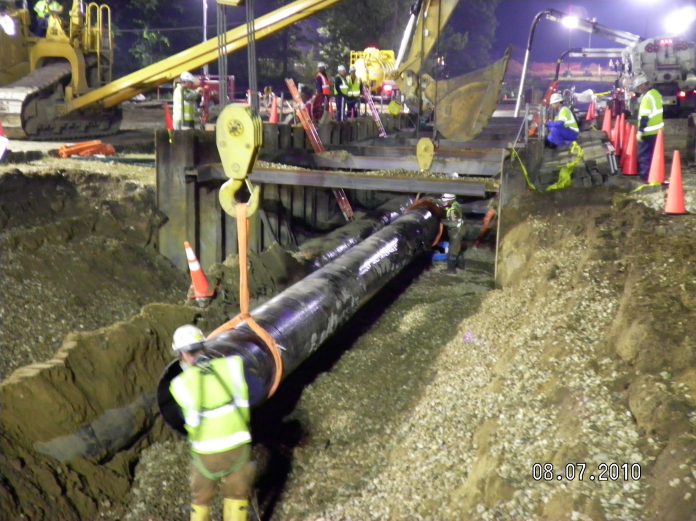The failure of Sen. Joe Manchin (D-WV) to garner enough support within the Democratic caucus to pass his Energy Independence and Security Act of 2022—designed to speed up the permitting process for conventional energy projects—leaves the door open for real permitting reform, says Benjamin Zycher, senior fellow at the American Enterprise Institute.
Zycher, in a letter to the editor published in the Wall Street Journal on September 29, 2022, says reforming the litigation process—the real source of delays and large cost increases—is needed now, after Manchin’s bill flopped.
Among the litigation reforms legislators should consider for the permitting process, says Zycher, is reining in multiple challenges to the updating or replacement of older facilities, which suppresses new capital investment, resulting in environmental damage. Reform would establish that once the “completeness” requirement for agency reviews is met, no further regulatory or legal challenges would be allowed.
‘Limitations on Endless Litigation’
Zycher is right that to ensure energy and infrastructure development substantial permitting reform is necessary, says John H. Benton, chief development officer at Hydroacoustics Inc.
“There need to be limitations on the endless litigation that takes place trying to stop certain energy projects,” Benton said. “Conflict groups are well-funded and their business is causing conflict, not helping to provide reasonable cost energy to the people living here.
“The net result of litigation is an increase in the cost of energy, which is something that hurts people on the low end of the economic scale significantly,” Benton said. “The conflict groups and the law firms representing them seem to not consider who really suffers from their efforts to eliminate cost-effective, environmentally sound energy projects.”
Level Playing Field
Although Manchin’s bill attempted to reduce duplicative permitting requirements in order to speed up the permitting process, it did nothing to reform what environmental impacts must be accounted for and how, or to level the regulatory playing field for the permitting process, says Benton.
“Wind, solar, oil, natural gas, hydro, nuclear, and other energy projects should be evaluated on a similar basis,” Benton said. “For example, solar and wind projects should account for the impact of mining and refining the rare earth metals needed for those projects to generate energy.
“That should take into consideration the health impacts on the individuals working in those mines as well as the environmental policies of the countries where those metals are mined and refined, said Benton. “If grid expansion is required, then the environmental impact of producing the copper for the wire needs to be included in the assessment, as well as the environmental impact of the energy projects required to back them up such that they can deliver their nameplate amount of energy.”
Evaluating Domestic Production
For domestic oil and gas development, regulators should consider how producing oil and gas in the United States compares environmentally to production in other countries with lower environmental standards from which we will otherwise import oil, says Benton.
“Oil projects should be evaluated on the impact of production in the United States where regulations are strict, compared to not doing the project and importing oil from countries with less strict regulations and fewer concerns about the health of the individuals laboring to produce that oil,” Benton said. “Permitting natural gas projects should evaluate the distance from the project to its planned market—less transportation means less energy cost to move the natural gas, and less environmental impact.
“True permitting reform should reduce the cost of energy to ordinary Americans,” said Benton. “The obvious ancillary benefit is more long-term stable employment in the United States and better energy security.”
Limiting Federal Power
The success of our electric grid has been built upon a system whereby state regulators and decision makers are more accountable to their ratepayers than to the Federal Energy Regulatory Commission (FERC)says Brent Bennett, Ph.D., policy director for Life:Powered, an initiative of the Texas Public Policy Foundation.
“Competitive markets, when properly designed, can also provide accountability by giving people choices as to where they procure their electricity,” said Bennett. “The further we devolve power away from ratepayers—first to state regulatory agencies, then to regional transmission organizations, and then to the feds and FERC—the more room there is for special interests to insert themselves in the rulemaking processes and create structures that benefit them at the expense of ratepayers.
FERC wants the authority to meddle in the siting decisions for powerlines, in order to push its preferred projects, says Bennett.
“Currently, FERC is attempting to abrogate power to itself in order to benefit wind and solar developers and investor-owned utilities looking to profit from wind and solar development,” said Bennett. “The way to build a cheaper, more reliable electric grid is to (a) stop the subsidies causing us to overbuild wind and solar and leading to innumerable indirect costs and reduced grid reliability, (b) create regulatory structures that are accountable to ratepayers and singularly focused on their benefit, and (c) stop the flood of federal regulations making electricity generation from fossil fuels and nuclear far more expensive than they should be and are doing almost nothing to benefit the environment or public health.”
With regard to the provision of electric power, Manchin’s proposal would have made the current bad situation worse, says Bennett.
“As long as FERC continues to be given more power, which the permitting bill from Sen. Manchin would have done in several ways, these problems will continue to multiply, ensuring we would continue to face an uphill battle against the rent-seeking entities having the resources to lobby FERC commissioners; we need to take power away from FERC and give it back to the ratepayers and the states and localities that more closely represent them,” Bennett said.
Kenneth Artz (KApublishing@gmx.com) writes from Dallas, Texas.
For more on pipelines and infrastructure, click here.
For more on NEPA reform, click here.


























